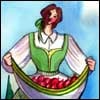Parsaht Ki Tavo begins with the mitzvah of bikkurim—the offering of the first fruits:
And it will be, when you come into the land … that you shall take from the first of all the fruit of the ground, which you will bring from your land, which the L-rd, your G‑d, is giving you. And you shall put [them] into a basket and go to the place which the L-rd, your G‑d, will choose to have His Name dwell there.1
Based on this verse, the Sifrei teaches that there is a requirement for the bikkurim to be placed into a vessel before being brought to Jerusalem.2 Indeed, this requirement is codified in halachah, with Maimonides stating:
The first fruits must be brought in a vessel, as the verse states: ‘And you shall place them in a basket.’ The most preferable way of performing the mitzvah is to bring each type of fruit in a separate container. If one brings them all in one container, he has fulfilled his obligation.3
This raises the question: Why must the fruits be placed specifically in a basket (teneh)?
To Beautify the Mitzvah
On the most basic level, Chizkuni comments that this requirement is meant to add honor to the mitzvah, ensuring it is performed with dignity. Thus, one should not bring them “in one’s lap or in the corner of the garment,” but rather in a manner that demonstrates respect and esteem.4
A Hint at How Much You Should Bring
The Baal HaTurim notes that the word טנא (basket) has the numeric value of 60. This hints to the rabbinic tradition that bikkurim are ideally taken as one-sixtieth of the harvest. For this reason, he adds, the letter samech—whose value is also 60—does not appear anywhere in the entire passage of bikkurim, to allude to this measure in a hidden way.5
Children as First Fruits
The Chatam Sofer explains that the verse, “And you shall take from the first of all the fruit of the ground and place it in a basket,” alludes not only to produce but also to children—the “fruit of the womb”—who should be dedicated to G‑d by raising them according to Torah. The numeric value of טנא (basket) with its vowel-points totals 120. This is because the vowel segol is three dots, and each dot is equal to ten; thus one segol = 30. The two segols in “teneh,” together with the numeric value of the letters themselves, equals 120. This symbolizes the blessing for a long life, “until 120,” that is associated with raising children in the spirit of Torah.6
Lights in Vessels
The Baal Shem Tov explained that on a deeper level, the phrase, “And you shall put it in a basket,” teaches that spiritual light must always be drawn into vessels. “And it shall be when you come into the land,” refers not only to physical entry into the Holy Land, but to an inner process.
The Hebrew word for “land” (eretz) also means ratzon—desire. Entering the land thus means attaining a state of deep will and longing for G‑d. The verse continues, “and you shall dwell there”—i.e., make that desire stable and settled, not a passing feeling. Then comes, “and you shall place it in a basket”—i.e., channel those lofty lights into concrete vessels. Finally, “you shall go to the place that the L-rd your G‑d will choose,”—teaching that wherever a Jew goes, it is with Divine choice and purpose.7
The Rebbe explains that this interpretation aligns with the nature of bikkurim themselves. They must be the choicest fruits, brought from the choicest parts of the land—not because of natural conditions but because the Holy Land is constantly watched by G‑d. Thus, bikkurim represent unlimited Divine light. Yet, the Torah insists, “And you shall put it in a basket.” The Sifrei comments: Bikkurim require a vessel. The Baal Shem Tov, as recorded in Degel Machaneh Ephraim, explained that the word טנא (teneh, basket) is an acronym for ta’amim, nekudot, otiot—cantillation, vowels, and letters. Just as ideas must be clothed in letters, vowels, and melody to be communicated, so must Divine light be drawn into vessels. Even the most transcendent inspiration needs form and structure to be lived and transmitted.
There are two kinds of “vessels.” One is the vessel of speech, as in prayer, where feelings are expressed through words, letters, and tones. The other is the vessel of action—deed itself. When Israel is on a high spiritual level, doing the will of G‑d, speech and prayer alone can draw down blessing. But in times when the people are not fully aligned with G‑d’s will, the work must descend further, into tangible action, into the toil of mitzvot in the physical world. This descent into action may seem a greater concealment, but in truth it achieves a higher elevation: through concrete deeds, Divine light penetrates the lowest realms and sanctifies the most material aspects of life. Thus, “You shall place it in a basket,” teaches that the unlimited light of bikkurim must always be grounded in vessels—whether of speech or of deed—so that holiness takes root in the world itself.8







Join the Discussion